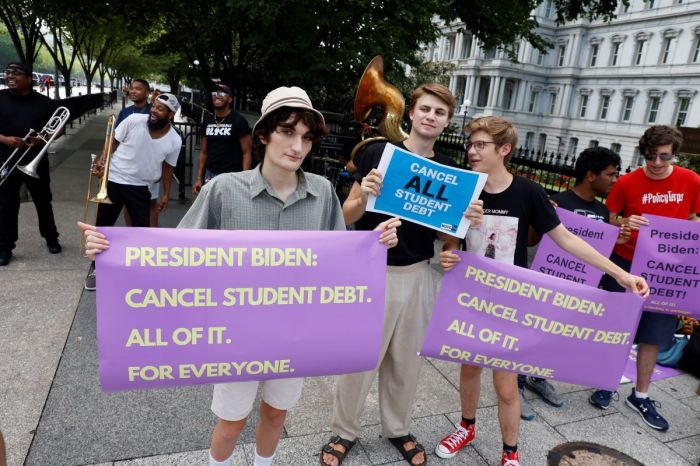Supreme Court strikes down Biden student loan debt forgiveness plan

The Supreme Court has rejected President Joe Biden’s student loan debt forgiveness plan, striking down an earlier lower court ruling in favor of the proposal.
In a decision released Tuesday morning, the high court ruled 6-3 in the case of Biden v. Nebraska that at least Missouri has standing to sue the government over the plan and that the plan itself goes beyond the secretary of education's official authority.
Chief Justice John Roberts authored the majority opinion, concluding that the debt forgiveness plan violated the Higher Education Relief Opportunities for Students Act of 2003.
Additionally, the majority concluded that the state of Missouri, one of the six states that sued the Biden administration, had standing to sue, as it was harmed by the debt forgiveness program.
"The question here is not whether something should be done; it is who has the authority to do it," wrote Roberts, "the Secretary of Education claims the authority, on his own, to release 43 million borrowers from their obligations to repay $430 billion in student loans. The Secretary has never previously claimed powers of this magnitude under the HEROES Act."
"Today, we have concluded that an instrumentality created by Missouri, governed by Missouri, and answerable to Missouri is indeed part of Missouri; that the words 'waive or modify' do not mean 'completely rewrite'; and that our precedent—old and new—requires that Congress speak clearly before a Department Secretary can unilaterally alter large sections
of the American economy."
Justice Elena Kagan filed a dissenting opinion, in which she was joined by Justices Sonia Sotomayor and Ketanji Brown Jackson, arguing in part that the states lacked the standing to sue.
"The plaintiffs in this case are six States that have no personal stake in the Secretary’s loan forgiveness plan. They are classic ideological plaintiffs: They think the plan a very bad idea, but they are no worse off because the Secretary differs," wrote Kagan.
"In giving those States a forum—in adjudicating their complaint—the Court forgets its proper role. The Court acts as though it is an arbiter of political and policy disputes, rather than
of cases and controversies. And the Court’s role confusion persists when it takes up
the merits."
In August of last year, Biden announced that his administration was unrolling a plan to forgive student loan debt, which would involve the Department of Education providing up to $20,000 in debt cancellation to Pell Grant recipients and as much as $10,000 in debt cancellation to non-Pell Grant recipients.
The plan was to be made available for individuals with student loan debt who made less than $125,000 a year and for married couples who made less than $250,000 a year.
Nebraska, Arkansas, Iowa, Kansas, Missouri and South Carolina sued the Biden administration over the debt forgiveness plan, arguing in part that it violated the Administrative Procedure Act and the separation of powers.
Last November, a three-judge panel of the U.S. Circuit Court of Appeals for the Eighth Circuit unanimously ruled against the administration, granting a preliminary injunction against the plan.
In a per curiam decision, the panel justified the injunction by noting that extensive potential harm the debt forgiveness plan had on the Missouri Higher Education Loan Authority, a major entity that holds and services student loans.
“Due to MOHELA’s financial obligations to the State treasury, the challenged student loan debt cancellation presents a threatened financial harm to the State of Missouri,” read the Eighth Circuit panel decision.
“Missouri has shown a likely injury in fact that is concrete and particularized, and which is actual or imminent, traceable to the challenged action of the Secretary, and redressable by a favorable decision. Missouri, therefore, likely has legal standing to bring its claim. And since at least one party likely has standing, we need not address the standing of the other States.”





























